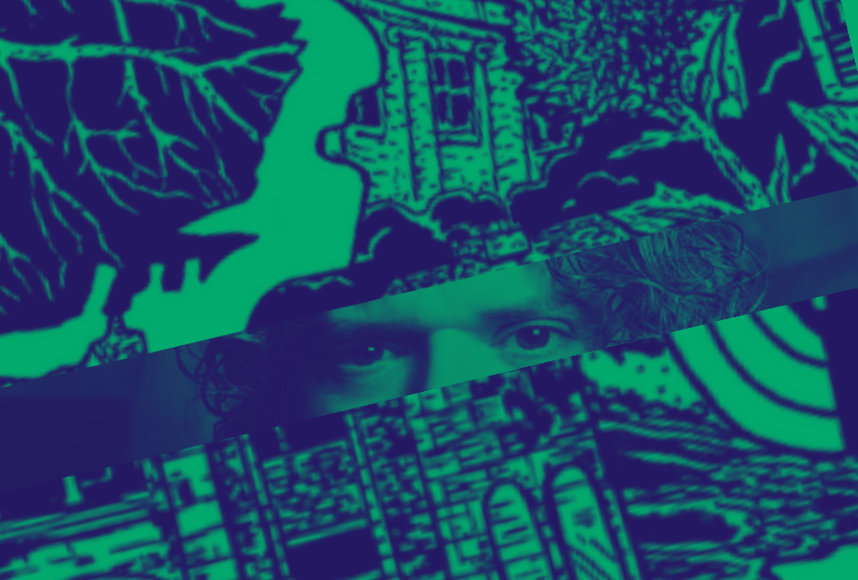A few years ago, author Shalom Auslander took a weight loss drug so poisonous that later, when he was hospitalized, doctors suspected he had tried to kill himself. Auslander claimed that he hadn’t, but the question remained, what made him hate himself enough to take such a dangerous substance?
The answer is the title of Auslander’s latest memoir, Feh, which came out last July from Penguin Random House. His near-death experience makes the author of the memoir Foreskin’s Lament take a second look back at his Haredi childhood in Monsey in the 1970s, where he tracks down the people who infected him with “feh,” a Yiddish word that Auslander uses to describe misanthropy so thorough that the person suffering from it hates himself just as much as he hates the rest of his species. The author goes on a journey to understand feh, but as many things as this interpretive lens allows him to see, it also blocks out.
Yeshiva educators whom he names “Rabbi Hammer” and “Rabbi Scold” communicate God’s feh narrative: per the former, when He created man, the angels expressed “disdain for the hideous lumpen mass.” God himself found the creature “totally, irredeemably feh,” according to Auslander’s half-joking account. This and other Torah interpretations reinforced a message Auslander says he received at home, where on Friday nights, his father “would get drunk, slur the words to the traditional Shabbos songs, bang his heavy fists on the table, and slap my brother in the face.”
But neither yeshiva nor the author’s dad are solely to blame for Auslander’s self-hatred. On his journey of feh-xploration, Auslander finds people from other cultures who also grew up with feh (though they may have had different words for it). Feh is also a story told in the news and through social media inventions such as Nextdoor that allow members to keep up with all the bad things people do to their neighbors.
Still, Auslander is wrong to equate his self-diagnosis to society at large, portraying the feh narrative as a central problem facing mankind. He refers to feh as “the single story we tell about ourselves, about our species, about humanity as a whole.” But is that really true, and does such a story really have no wisdom whatsoever to offer? Misanthropy and self-contempt can be harmful, but generally speaking, the problem with 50-something men isn’t usually that their self-esteem is too low.
The author’s hatred of the feh narrative pushes him too far in the opposite direction: glorifying people who might have really done wrong. When his therapist, Isaac Herschkopf, is accused of exercising undue influence on one of his many celebrity patients, Auslander doesn’t only appear to blame the allegations on what he views as a cynical culture, but fails to mention, anywhere in the entire book, what the allegations against Herschkopf — for which the New York State Department of Health stripped him of his license to practice medicine — actually are. “The man who had tried to show me that I wasn’t feh had been declared feh himself,” Auslander writes. Instead of just hating people who call us feh, can’t we also try to become less feh?
In another example, Auslander visits a bookstore and reduces every single book he finds on the New Releases table to one theme: “You Suck. You Suck Because You’re Male, You Suck Because You’re Liberal, You Suck Because You’re Conservative, You Suck Because You’re a Racist, You Suck Because You Don’t Think You’re a Racist, You Suck Because You Think Other People Are Racists, You Suck Because You Don’t Care About the Planet, You Suck Because You Care Too Much About the Planet, You Suck Because of Your Past, You Suck Because of Our Future.”
Some books may fit this theme, but surely some of them have something more to offer. Should nobody read books about politics or the environment? Is it the books that are calling Auslander feh, or is it Auslander who is feh-ing the books by taking their themes too personally, reducing them to stereotypes, and declining to learn whatever lessons they may contain?
To some extent, Auslander realizes that the feh is coming from inside the house, so to speak: he brings it with him wherever he goes, infecting his young children with it as he tries to discourage their rosy worldviews. He renders the symptoms of his feh — self-destructive habits and a cynical attitude — in at first funny, eventually tedious detail, with varying degrees of self-awareness.
A particularly low point comes when Auslander prays to God to kill the beloved movie star Paul Rudd, for the apparent sin of portraying Herschkopf in the Apple TV+ series ‘The Shrink Next Door.’ It’s hard to tell to what extent this is supposed to be interpreted as a criticism of a feh culture Auslander is accusing Rudd of being part of, and to what extent it’s a criticism of the feh inside Auslander himself that would make him wish death upon a fellow human being.
Near the end of the book, after hundreds of pages of self-loathing, Auslander abruptly and inexplicably claims that he now views life differently. In life, when people change internally, or heal from a lifelong mental illness, the change takes place slowly, almost imperceptibly, and in ways we could have never quite expected. Not so for Auslander: “The life I wanted to end when I was younger, I now want to last forever,” he writes, ascribing the sudden change of heart to his wife’s support and a Thanksgiving meal shared with his local community.
But it’s hard to believe that anything has substantively changed in the short time period the memoir explores. After all, if feh was that easy to recover from, it must not have been that powerful in the first place.

